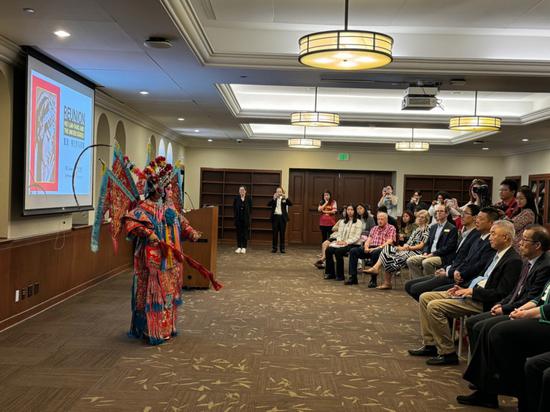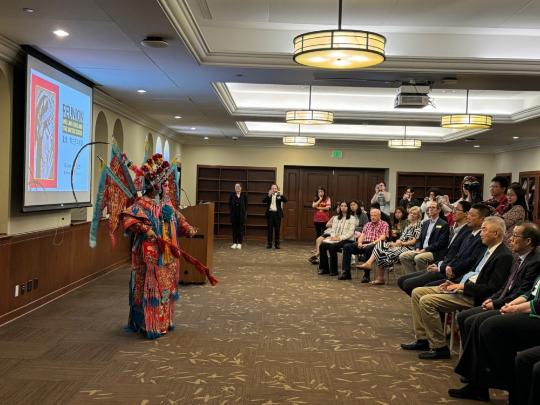Exhibition explores Mei Lanfang's legacy, historic visit

The exhibition Reunion: Mei Lan-Fang and the United States, commemorating the 130th anniversary of the Peking Opera legend's birth and historic trip to the US, opened on Sept 13 at the USC East Asian Library. (RENA LI/CHINA DAILY)
Mei Lanfang is a legendary figure in Peking Opera, and the University of Southern California is marking the 130th anniversary of his birth and whirlwind tour of the US with an exhibition.
The exhibition, Reunion: Mei Lan-Fang and the United States, at USC's East Asian Library also commemorates the 94th anniversary of Mei's historic visit to America. It explores a romantic narrative of connection, legacy and reunion — honoring Mei's lasting influence and the cultural ties that continue to bridge nations.
In early 1930, Mei embarked on a tour of the US, performing in cities such as Los Angeles, San Francisco, Chicago, Washington DC, and New York.
Few moments in history had brought the United States and China closer than the six months Mei spent captivating American audiences with his Peking Opera performances, according to media reports.
Thousands filled theaters across the country to witness his art, and many more had the chance to meet him personally at receptions, banquets and public gatherings.
The visit played a "groundbreaking" role in fostering cultural exchanges between China and the US, according to Li Shufeng, vice-president of the Chinese National Academy of Arts (CNAA), the co-organizer of the exhibition with USC.
"This art exhibition is an effort to follow the path paved by our predecessors," Li said during the opening ceremony of the exhibition on Sept 13 at USC East Asian Library. "It introduced American audiences to the beauty of Chinese opera and the richness of China's ancient cultural heritage, offering them a window into China's long history."
Los Angeles was the most significant stop during Mei's US visit. It was in LA that he was welcomed by Hollywood and opera enthusiasts, receiving recognition from both the performing arts and academic communities. Notably, USC awarded Mei an honorary doctorate.
"In honor of this recognition that has spanned a century, we followed in the footsteps of President Mei Lanfang and brought his life and art back to this campus, which once held deep affection for him, continuing this beautiful and romantic story," Li said.
The exhibition, which will run to Dec 20, has four sections — Children of Liyuan, Master of Danjiao, Envoy to the US, and Reunion Today — that feature oil paintings and traditional Chinese artworks centered on Mei.
The exhibition also has a range of significant academic publications on Mei and the Mei school of art, along with historical artifacts such as vintage photos, playbills, and maps from Mei's 1930 visit to the US.
"Through these multifaceted exhibits, the exhibition brings to life Mei's personal journey, stagecraft and his historic tour of the US, offering audiences a deep and captivating glimpse into the aesthetics and spiritual essence of traditional Chinese opera, as embodied by Mei," Li explained.
Melissa Just, dean of the USC Libraries, told the audience that the connection between Mei and USC makes the East Asian Library the perfect venue for this exhibition.
"Today with Mei's (exhibition) return to USC, this beautiful reunion allows us to step back in time and explore Mei's remarkable life. This is a true cross-cultural collaboration," Just said.
The exhibition marks the beginning of cooperation between the CNAA and USC. The two sides have signed a memorandum of understanding for exchanges in the next five years. All the exhibits have been donated by the CNAA to USC.
Mei and the traditional Chinese culture represented by Peking Opera also have been subjects of continuous research by scholars in the US. One notable scholar is Joshua Goldstein, a professor of history and East Asian languages and cultures at USC. Goldstein has spent decades researching the evolution and dissemination of Peking Opera. His book, Drama Kings: Players and Publics in the Re-creation of Peking Opera, 1870-1937, specifically mentions Mei's visit to the US, highlighting its significance in Peking Opera's development and international impact.
Mei's historic visit to the US in the 1930s represents a significant moment in cultural exchange amid a turbulent time, Goldstein said. During his visit, Mei forged friendships with Western contemporaries, including silent film actor Charlie Chaplin.
"Mei was an innovative figure in Peking Opera," Goldstein noted. "He skillfully blended traditional elements with modern phenomena such as film and visual displays. His approach to character types was also innovative, moving beyond the strict limitations of previous eras."
Mei has been hailed as a "creator of beauty". He inherited traditions while also pioneering innovation, organizing and producing many classic operas. Those performances continue to captivate audiences today.
Two young talents from the LA Youth Peking Opera Troupe performed selections from Mei school's classics The Drunken Concubine and Mu Guiying Takes the Command, earning enthusiastic applause on Sept 13.
Mei's family members, including his grandson Mei Weidong and great-grandson Mei Ruiqi, also attended the exhibition, reliving the legacy and dreams of their esteemed ancestor.
"As descendants of the Mei Lanfang family, we not only inherit the spirit and cultural traditions of our ancestors, but also have a responsibility to continue promoting cultural exchange and understanding," Weidong told China Daily.
In fact, the Mei family has longstanding ties with USC beyond Mei Lanfang's honorary doctorate. Mei's great-grandson, Mei Ruiqi, graduated with a master's degree from USC's business school, while his great-granddaughter earned a degree from USC's medical school.
"This deep connection between the Mei family and USC has a rich history," Weidong said. "Moving forward, we are committed to continuing our efforts to foster cultural exchange between China and the US."

